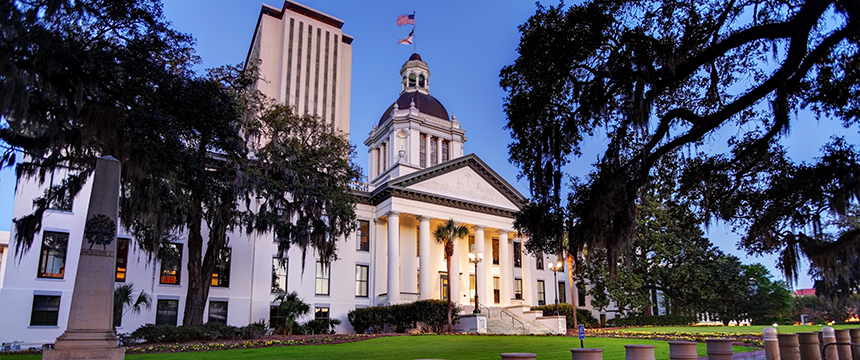Florida Safer At Home: Executive Order 20-91 Essential Services and Activities During Coronavirus Emergency

On April 1, 2020, Florida Governor Ron DeSantis issued Executive Order Number 20-91 to “ensure that the spread of COVID-19 is lowered, and that residents and visitors in Florida remain safe and secure.” The Executive Order issues a Safer At Home statement and defines essential services and essential activities. Executive Order 20-92 amends Section 4 of Executive Order 20-91 to state that the order supersedes any conflicting official action or order issued by local officials in response to COVID-19, and otherwise ratifies and reaffirms Executive Order 20-91. The Executive Order becomes effective 12:01 a.m. on April 3, 2020, and expires on April 30, 2020, unless extended by subsequent order.
Safer At Home
The Executive Order requires senior citizens and individuals with significant underlying medical conditions to “stay at home and take all measure to limit the risk of exposure to COVID-19.” In addition, “all persons in Florida shall limit their movements and personal interactions outside of their home to only those necessary to obtain or provide essential services or conduct essential activities.” The order expressly provides that it does not prohibit, but rather encourages, individuals to work from home.
Essential Services
“Essential Services” includes the list provided by the U.S. Department of Homeland Security in its Guidance on the Essential Critical Infrastructure Workforce v. 2 dated March 28, 2020, and any subsequent lists, as well as those businesses and activities designated by Executive Order 20-89 and the list propounded by Miami-Dade County attached thereto. In addition to the services identified by the Department of Homeland Security, essential retail and commercial businesses (identified by reference to Executive Order 20-89 and the attachment thereto) include:
- healthcare providers, including pharmacies
- grocery stores and other establishments engaged in the retail sale of food or other household consumer products (such as cleaning and personal care products)
- food cultivation
- businesses providing services for necessities of life for economically disadvantaged or otherwise needy individuals
- media services
- gas stations and auto repair and supply facilities
- the provision of propane and natural gas
- banks
- hardware stores
- services that are necessary to maintain safety, sanitation, and essential operation of residences and other structures
- mailing and shipping services
- private colleges but only as needed to facilitate distance learning and university, college, or technical college residence halls to the extent needed to accommodate students who cannot return to their homes
- laundry service providers
- restaurants, businesses that ship or deliver food directly to residences, and schools and other entities that provide free food services to students and members of the public
- office supplies
- private transportation providers
- home-based care, assisted living facilities, nursing homes, adult day care centers, and senior residential facilities
- professional services, such as legal and accounting services, when necessary to assist in compliance with legally mandated activities
- landscaping and pool care
- childcare facilities subject to certain limitations
- businesses operating at airports, seaports, or other government facilities
- pet supply stores
- logistics providers
- telecommunications providers
- open construction sites
- architectural, engineering, or land surveying services
- factories, manufacturing facilities, bottling plants, or other industrial uses
- waste management services
- businesses interacting with customers solely through electronic or telephonic means and delivering products via delivery services
- businesses providing services to any local, state, or Federal government, including municipalities, pursuant to a contract with such government
- office space and administrative support necessary to provide listed activities
- private and municipal boat launches and marinas consistent with other emergency orders
- hotels, motels, or other commercial lodging establishments consistent with other emergency orders
- veterinarians and pet boarding facilities
- mortuaries, funeral homes, and cemeteries
- the sale of alcoholic beverages consistent with Executive Order 20-71
- firearm and ammunition supply stores
Please refer to the Florida Division of Emergency Management’s website and on the Florida Department of Health’s website for more details.
In addition, the order permits the State Coordinating Officer, in coordination with the State Health Officer, to approve additional essential services. It likewise requires the State Coordination Officer to maintain a list of essential services at the websites of the Florida Division of Emergency Management and Florida Department of Health.
Essential Activities
Under the Executive Order, “essential activities” include attending religious services, recreational activities consistent with social distancing guidelines, taking care of pets, and caring for or otherwise assisting a loved one or friend. Social gathering in public spaces are not considered essential activities, and local jurisdictions are required to ensure that groups of greater than ten people are not permitted to congregate in any public space.
The Executive Order provides that other essential activities may be added to the list with approval of the State Coordinating Officer, in close coordination with the State Health Officer. The list of essential activities will be maintained online by the State Coordinating Officer.
A copy of Executive Order 20-91 is attached hereto, and may be accessed here.
Foley’s Government Solutions group, including the Tallahassee-based Florida practice, provides regulatory and compliance counseling, guidance through all aspects of the government contracting process, and public policy and government relations services at the federal, state, and local level.
For more information about recommended steps, please contact your Foley relationship partner. For additional web-based resources available to assist you in monitoring the spread of COVID-19 on a global basis, you may wish to visit the CDC and the World Health Organization.
Foley has created a multi-disciplinary and multi-jurisdictional team, which has prepared a wealth of topical client resources and is prepared to help our clients meet the legal and business challenges that the coronavirus outbreak is creating for stakeholders across a range of industries. Click here for Foley’s Coronavirus Resource Center to stay apprised of relevant developments, insights and resources to support your business during this challenging time. To receive this content directly in your inbox, click here and submit the form.


